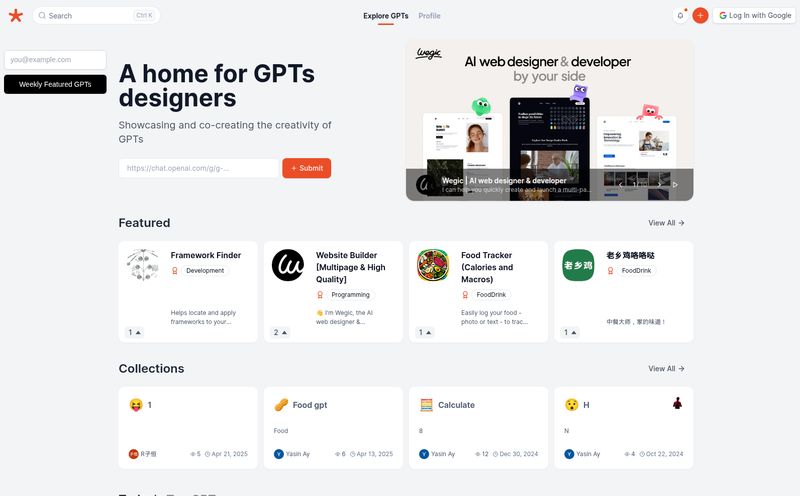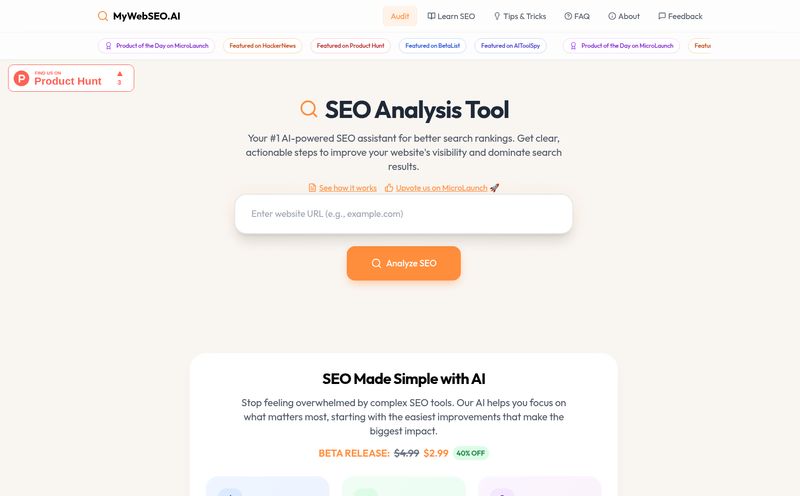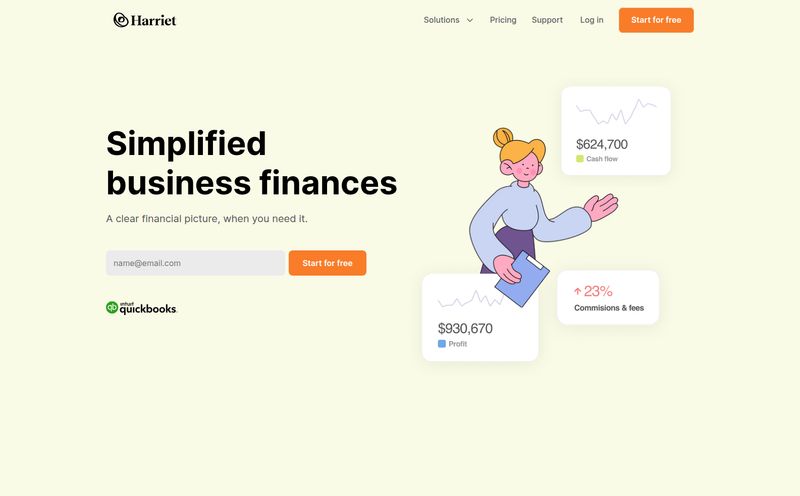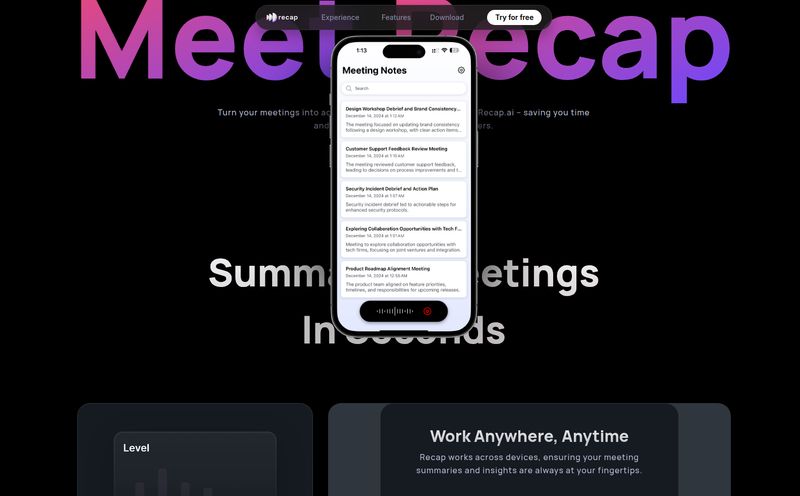If I had a dollar for every time I’ve downloaded a new productivity app, promising myself “this is the one,” I’d probably have enough money to hire someone to just do my work for me. The cycle is always the same: a burst of enthusiasm, a week of meticulous tracking, and then… poof. I forget to start the timer, I miscategorize my tasks, and the whole system falls apart. It becomes more work to manage the tool than to do the actual work. Ugh.
So when I first heard about Rize, I was skeptical. An “AI-powered time tracker”? It sounded like another gimmick wrapped in fancy tech jargon. But the core promise—that it tracks your time automatically without you having to start or stop a single timer—was enough to pique my interest. Could this be it? The end of the time-tracking tyranny?
I decided to give it a spin. And folks, I’m still using it months later. Which, for me, is the ultimate testament. It’s less of a tool and more like a quiet, data-savvy partner that helps you understand where your day actually goes.
What is Rize Anyway? More Than Just a Digital Clock
At its heart, Rize is a desktop app for macOS and Windows that sits quietly in the background, observing your digital habits. It watches which app or website is in your active window and for how long. Forget hitting a 'start' button when you begin working on a client proposal or a 'stop' button when you get lured into a Twitter rabbit hole. Rize sees it all.
But it's not just a spy. It’s an analyst. It takes all that raw data and transforms it into a digestible, and frankly, sometimes shocking, report of your day. It’s like having a personal efficiency consultant who presents you with a clear, non-judgmental breakdown of your focus, your distractions, and your work patterns. It's the difference between looking at a clock and truly understanding your time.
The Sheer Magic of Automatic Time Tracking
This is the killer feature. This is the whole ballgame. The single biggest reason most of us fail with time tracking is human error. We are flawed, forgetful creatures. Rize removes that point of failure completely.
The first time I opened my Rize dashboard at the end of the day, it was a revelation. It showed neat blocks of time categorized automatically: 'Code' from my time in VS Code, 'Design' from my hours in Figma, 'Messaging' from Slack, and yes, 'Email' from the black hole that is my inbox. It even saw my meetings by integrating with my Google Calendar. There was my entire day, mapped out with an accuracy I could never achieve manually.
It’s not just about logging hours for a timesheet. It’s about seeing the fragmentation. “Wow, I only had one solid 45-minute block of focus time today.” or “I spent nearly two hours just switching between Slack and email.” These are the insights that actually lead to change.
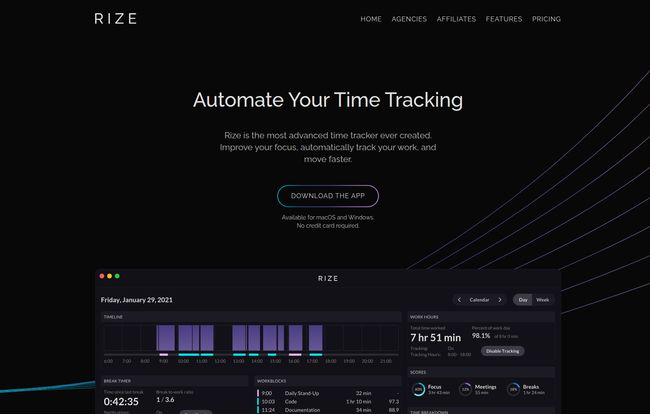
Visit Rize
My Favorite Rize Features for Deep Work
Once you get past the core automatic tracking, you find a whole suite of tools designed to actively help you improve your focus, not just report on it.
The AI-Powered Nudges You Actually Need
Rize has these little notifications that pop up based on your activity. If you've been grinding away for too long, it will gently suggest, “Time for a break?” It’s not an annoying, arbitrary Pomodoro timer; it’s a smart suggestion based on your actual sustained effort. Similarly, it has an overworking notification to help prevent that late-night burnout we’re all too familiar with. It’s like a gentle tap on the shoulder from a colleague who cares.
Taming the Digital Jungle with the Distraction Blocker
We all have our kryptonite. For some its Reddit, for me, it's YouTube. Rize's distraction blocker is a godsend. You can tell it which sites are off-limits during a focus session. When you instinctively type in that URL, Rize throws up a screen that basically asks, “Are you sure you want to do this?” That brief pause is often all it takes to break the habit loop and get back on track. It's a simple but remarkably effective bit of behavioral design. They even bundle in Focus Music—a curated list of ambient tracks—which is a really nice touch for drowning out the world.
Seeing the Big Picture with Reports and Categories
This is where the magic really pays off long-term. Every day and week, Rize sends you a summary email. It gives you a “Focus Score,” shows your most productive times, and highlights your biggest time sinks. I’ve made my Monday morning review of my weekly Rize report a non-negotiable ritual. It helps me set better goals for the upcoming week. For freelancers and agencies, the ability to create custom categories and tag time to specific projects or clients is invaluable. It takes the guesswork out of billing and project management.
Who Should Use Rize? (And Who Might Not)
I've always felt that no tool is a perfect fit for everyone. Rize is powerful, but it's built for a specific type of professional. In my experience, it's a game-changer for:
- Freelancers & Agencies: The automatic project and client tracking is a dream. The ability to export beautiful PDF reports to justify invoices or show progress is a professional touch that clients appreciate.
- The Overworked Professional: If you constantly feel like you're busy but not productive, Rize will show you why. The burnout and break reminders are designed for you.
- Founders and Managers: Getting a clear, data-driven overview of where your own time is going is the first step to leading a team more effectively.
- Productivity Nerds: If you love data, metrics, and self-optimization, you will adore Rize. It gives you all the quantifiable goodness you could ever want.
However, if your work happens mostly away from a computer—say, you're a photographer on shoots all day or a contractor on-site—Rize obviously won't capture the bulk of your work. And as of now, it's only for macOS and Windows, so Linux users will have to wait a bit longer.
Let's Talk About the Rize Pricing
Alright, the all-important question: what does it cost? Rize has a tiered structure that’s pretty straightforward. I've broken it down here:
| Plan | Price (Annual Billing) | Best For |
|---|---|---|
| Free | $0 | Testing the waters. Only retains 1 day of data, so it's more of a daily snapshot than a long-term tool. |
| Standard | $9.99 / month | Most individuals. This unlocks all the historical data, reports, and AI insights. This is the sweet spot. |
| Professional | $23.99 / month | Power users, freelancers, and agencies who need project tracking and Zapier integration. |
Note: Prices are lower when billed annually. Monthly billing is also available for more flexibility.
My take? The Standard plan is an absolute bargain. If Rize helps you reclaim even two or three hours of focused work a month—which it easily has for me—it has already paid for itself many times over. The free plan is fine for a quick look, but its value is limited by the one-day data retention.
A Few Things to Keep in Mind
No tool is without its quirks. First, there's the 'creepiness' factor. Yes, an app watching your every move on the computer can feel a bit Big Brother at first. However, Rize is very transparent about their security. The data is yours, it's encrypted, and it's all stored securely on AWS. I got over it pretty quickly once I saw how useful the data was.
Second, it's not pure magic out of the box. While it does a great job of guessing, you'll get the most value by spending a little time in the first week teaching it. You can easily re-categorize activities and create rules, so the AI gets smarter and more personalized over time. It’s a small investment for a huge payoff.
The Verdict: Rize Is My New Default
Rize has done what a dozen other apps couldn't: it has stuck. It's become a core part of my workflow not because I force myself to use it, but because it provides genuine, passive value. It doesn't ask anything of me during the day, yet it gives me incredible insights at the end of it.
It’s a powerful mirror that reflects your digital work life with unflinching honesty. If you're serious about improving your focus, building better habits, and truly understanding where your most valuable asset—your time—is going, I can’t recommend it highly enough. It might just be the last time tracker you ever need to try.
Frequently Asked Questions about Rize
- How does Rize track my time automatically?
- Rize runs as a desktop app that monitors the title of the active window on your computer (e.g., the app you're using or the URL in your browser). It then uses its AI to categorize that activity without you needing to press start or stop.
- Is Rize safe to use with my private data?
- According to their website, security is a top priority. Your data is hosted on Amazon Web Services (AWS), protected behind a personal account, and encrypted both at rest and in transit. This is a pretty standard and robust security setup for modern apps.
- Can I really use Rize for free?
- Yes, there is a free plan. It includes many of the core features like the distraction blocker and focus music, but its main limitation is that it only retains one day of your tracking data. To see trends and get weekly reports, you'll need a paid plan.
- What happens if I stop paying for my Rize subscription?
- If you cancel a paid plan, you can still access all of your past data that was tracked. However, the app will stop tracking any new activity going forward until you subscribe again.
- Does Rize work on all computers?
- Currently, Rize is available for macOS (10.14.6 or later) and Windows (10 or later). They have mentioned that support for Linux will be coming in the future.
- Is Rize hard to set up?
- No, the initial setup is very simple—just download and install the app. The real power comes from spending a little time customizing your categories and rules to match your specific workflow, which is an intuitive process.
